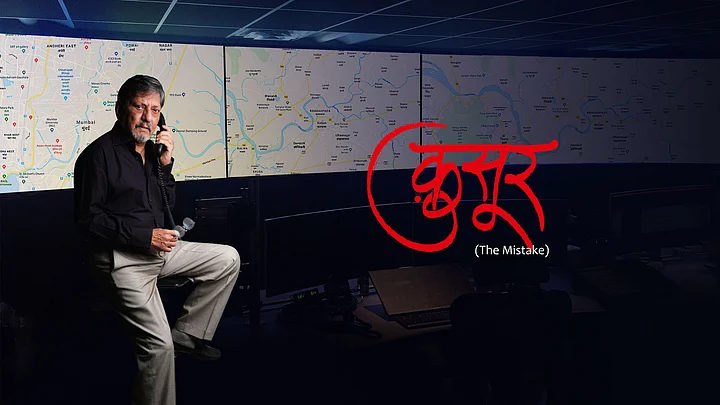(There are spoilers in this review)
Hrishikesh Mukherjee’s Golmaal (1979) is one of my all time favourite films, and Amol Palekar epitomised the average Indian man, having started with films like Rajnigandha, Choti Si Baat and Chitchor. His relatability and charm won audiences over and he became a part of what was then known as ‘middle-of-the-road’ cinema. Which is why it’s a joy to see him back, this time on stage after 25 years with Kusur - The Mistake.
The play adapted from the Danish film Den Skyldige by Sandhya Gokhale takes places over a rainy night in Mumbai. Amol Palekar plays Ashok Dandavate, a retired Assistant Commissioner of Police, who has been deputed to the emergency control room. There are a bunch of calls that keep coming, but one call catches his attention, a woman on the other line, who in a frightened tone conveys that she is trapped in a car with her husband, who is making her feel unsafe. She wants Ashok to reach out to her son, who is alone at home with his younger sister.
Palekar who has co-directed the play along with Gokhale spends the first ten minutes giving us a feel of the emergency control room and then dives right into the mystery of the call. The exchanges between Palekar and the woman on the call are some of the most interesting bits of the play. The makers have wonderfully used sound design to create a sense of tension and suspense.
The calls come and go, and are interrupted by other elements which aids the sense of urgency that the play creates.
For me, what sets Kusur apart from the other plays I’ve seen is the realism. I have to admit that I haven’t been exposed to theatre as much, but Kusur worked for me because of the way in which the lines were delivered. They felt real, just like Palekar’s films. The parts where the play dips is when they’re delving into Ashok’s past, which they do to explain the title Kusur.
But midway, you begin to realise things aren’t really the way you think they are, and from there on the play does tend to get predictable. What held my attention, were the performances. The artists voicing the characters on the phone do a wonderful job of evoking empathy from the audience, particularly the child actor.
But, at the centrepiece of course is Amol Palekar, as the calm and resilient Ashok. The direction by him and Gokhale, really made me feel worried for the state of the characters on the phone call. And there was a sense of reassurance because of Palekar’s demeanour. He’s kind and empathetic as he talks to the lady on the call, and even to her child, and yet in another moment he’s abusing the cops at the local police station for their lazy attitude. There’s not a moment in the 1 hr 20 mins run time of the play where Palekar isn’t there, and he engages you completely. In fact, there aren’t too many changes in the scenario, or elaborate setups.
Kusur is hinged completely on its writing, which made me a little restless towards the end, when I knew exactly what the final reveal would be. One could also probably blame that on the instant gratification I’m used to with social media and the habit of binging on content on Netflix and Amazon Prime Video. There’s an overarching message of our urban reality in Kusur, about how we jump to conclusions, sometimes without introspection. The play ends with Palekar’s character emphasising on the need to introspect, and that is much needed indeed.
(Kusur is brought to you by BookMyShow and has been adapted by Sandhya Gokhale, and co-directed by Amol Palekar and her.)
(At The Quint, we question everything. Play an active role in shaping our journalism by becoming a member today.)
